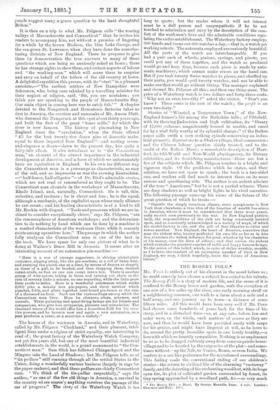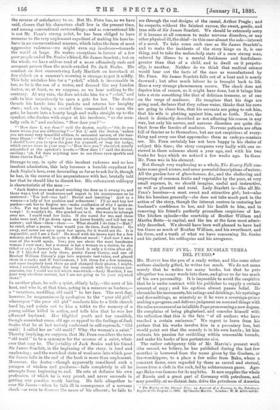THE ROSERY FOLK.*
MR. FENN is entirely out of his element in the novel before us ; he could scarcely have chosen a subject less suited to his talents. The Reser?' Folk is a story of modern life, and the scene of it is confined to the Rosery house and garden, with the exception of one row of a few miles up the river, one early morning stroll on a neighbouring common, one walk to a farm about a mile and a half away, and one journey up to town—a distance of some fifteen miles. All this would have been very well if Mr. Fenn had chosen some hundreds of years back for the time of hist story, and in a disturbed time—or, at any rate, before law and order were, on the whole, such matters of course as they are now, and then he would have been provided easily with scope for his genius, and might have lingered at will, as he loves to do, around the pretty, homelike spots in one lovely locality,—a love with which we heartily sympathise. Nothing is so unpleasant to us as to be dragged suddenly away from some exquisite homevillage and to be hurried by the exigencies of the plot—and sometimes without—up the Nile, to Venice, Rome, or even India. We confess to a cat-like preference for the accustomed surroundings. This feeling made the conventional ending of our children's stories—the return to civilised life of the charming " castaway " family, and the deserting of the enchanting wood hut, with its huge open fire, its plot of cultivated garden surrounded by forest, its tiny spring approached by a woodland path, &c.—so very much
the reverse of satisfactory to us. But Mr. Fenn has, as we have said, chosen that his characters shall live in the present time, and among conventional surroundings ; and as conventional life is not Mr. Penn's strong point, he has been obliged to have recourse to the very unpleasant expedient of making his hero behave in an unconventional manner, which takes the form of most aggressive rudeness—we might even say iusolenee—towards the world at large. He makes exceptions in favour of a few poor people and of Dr. Scales's friend, Sir James Scarlett ; but on the whole, we have seldom read of a more offensively rude and arrogant person than the much-extolled Dr. Jack Scales. His conduct on first encountering Lady Martlett on horseback at five o'clock on a summer's morning is strange, to put it mildly. This lady mistakes him for a "yokel," which is inexcusable in her, as he is the son of a rector, and dressed like any London doctor, or, at least, so we suppose, as we hear nothing to the contrary. At any rate, she does mistake him for a "yokel," and calls to him imperiously to open a gate for her. The doctor thrusts his hands into his pockets and returns her haughty stare ; and, on being a second time commanded to open the gate, he bursts into a hearty laugh and walks straight up to the speaker, who flushes with anger at his insolence, "as she men tally calls it," and exclaims, "How dare you r —
" How dare I, ray dear ?' said the doctor, coolly.—' Sir, do you know whom you are addressing ?'—' Not I,' said the doctor, unless you are some very beautiful edition, in animated nature, of the huntress Diana.'—' Sir !'—' And if you were not such a handsome woman, I shouldiearo you to open the gate for yourself, or leap the hedge, which seems more in your way.'—' How dare you ?' she cried, utterly astonished at the speaker's words.—' How dare I?' said the doctor, smiling ; oh, I'd duro anything now to see those eyes sparkle and those cheeks flush.'"
Strange to say, in spite of this insolent rudeness and no less insolent admiration, this lady becomes a humble suppliant for Jack Scales's love, even descending so far as to ask for it, though he has, in the course of his acquaintance with her, brutally told her that he should like to dissect her. His subsequent soliloquy is characteristic of the man :—
" Jack Scales rose and stood watching the door as it swung to, and there was a look of tenderness and regret in his countenance as he muttered : Too bad—too bad ! Brutal and insulting ! And to a woman—a lady of her position and refinement ! I'll go and beg her pardon—ask her to forgive me—make confession of why I spoke so. —No. Put my head beneath her heel, to be crushed by her contempt ! It wouldn't do. She goaded me to it. She wants to triumph ever me. I could read her looks. If she cured for me, and those looks were real, I'd go down upon my knees humbly and tell her my sorrow ; and then—then—then— What should I do then P—Hah !' he cried, after a pause, what would you do then, Jack Scales ! Go away, and never set eyes upon her again, for it would not do. It is impossible, and I am a fool.' He stood with his brows knit for a few minutes, and then said, in quite a different mood : And now I am a man of the world again. Yes; you are about tbe most handsome woman I ever saw; but a woman is but a woman to a doctor, be she titled or only a farmer's lass. Blue blood is only a fiction after all ; for if I blooded my lady there, pretty Fanny Cressy, and one of Brother William Cressy's pigs into separate test-tubes, and placed them in a rack ; and if furthermore, I left them for a few minutes, and some busybody took them up and changed their places, I might, when I returned, fiddle about for long enough with the various corpuscules, but I could not tell which was which.—Lady Elartlett, I am your very obedient servant, but I am not going to be your rejected slave."
In another place, he calls a quiet, elderly lady,—the aunt of his host, and who is, at that time, acting in a measure as hostess,— a "vexatious, meddling, old maid" to her face. The next day, however, he magnanimotkly apologises to the " poor old girl." whereupon "the poor old girl" conducts him to a little church hard by, and points out to him a tablet to the memory of a young soldier killed in action, and tells him that he was her affianced husband. Her blighted youth and her unselfish, though somewhat cross, old age so appeal to the feelings of Jack Scales that he at last naïvely exclaimed in self-reproach, Old maid ! I called her an old maid Why, the woman's a saint." Thereby implying, we suppose, that Mr. Fenn considers the term "old maid" to be a synonym for the reverse of a saint, whatever that may be. The joviality of Jack Scales and his friend Sir James Scarlett, in the beginning of the story, is loud and nupleasing ; and the wretched state of weak uess into which poor Sir James falls in the end of the book is more than unpleasant.
Moreover, the doctor—though apparently considered such a paragon of wisdom and goodness—fails completely in all he attempts from beginning to end. He sets at defiance his own profession, of which he is very proud, and never succeeds in getting any practice worth having. He fails altogether to cure Sir James—when he falls ill in consequence of a nervous shock--or even to discover the cause of his ailment; he fails to see through the real designs of the rascal, Arthur Pragle ; and he suspects, without the faintest excuse, the sweet, gentle, and true wife of Sir James Scarlett. We should be extremely sorry if it became at all common to make nervous disorders, or any other physical ill, the chief—in this case almost the sole—interest of a novel. To take some such case as Sir James Scarlett's, and to make the incidents of the story hinge on it, is one thing, and to take the melancholy state of a once strong man, reduced by illness to a mental feebleness and fearfulness greater than that of a child, and to dwell on it perpetually, is another. Neither do we think that medical science would bear out the facts of the case as manufactured by Mr. Fenn. Sir James Scarlett falls out of a boat and is nearly drowned ; but after much labour he is brought back to life. Here a very strange phenomenon occurs. The shock does not deprive him of reason, as it might have done, but it brings him into a state something like that of delirium tremens, or of one on the verge of madness. He imagines that his dogs are going mad, declares that they refuse water, thinks that his cows are going to chase him, that his servants are going to rob him, that his wife is plotting against him, and so forth. Now, the shock is distinctly described as not affecting his reason in any way, but only his nerves, and nervous disorders are quite distinct from the fancies of madness. Nervous patients are often full of fancies as to themselves, but are not suspicious of everything and every one that approaches them as embryo-maniacs are. Mr. Fenn certainly has not been happy in his choice of subject this time; the story compares very badly with one reviewed in these columns about a year ago, and with his two books for boys which we noticed a few weeks ago. In these Mr. Fenn was in his element.
But though very unpleasing as a whole, The Rosery Folk contains some good scenes, and some powerful descriptions of nature. All the garden-lore of glass-houses, &c., and the sheltering and improving of common fruits and vegetables by the poor, at very small expense, is, we should imagine, useful and instructive, as well as pleasant and rural. Lady Scarlett is—like all Mr. Penn's heroines—a most sweet and attractive girl; but—also like his heroines generally—she does not take much part in the action of the story, though the interest centres in Testming her husband's confidence to her, and his health to him, and in removing his friend's perfectly groundless suspicions of her. The kitchen episode—the courtship of Brother William and Martha Betts—is capital, and the tea at the farm most admirably described. We should have been well pleased to have had ten times as much of Brother William, and his sweetheart, and his farm, and a tenth of what we have concerning Dr. Scales and his patient, his soliloquies and his arrogance.



































 Previous page
Previous page